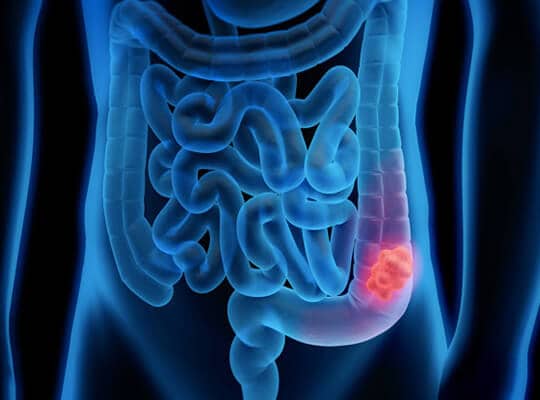Colorectal Cancer
Table of Contents
Colon cancer is one of the most common cancers for which there is no clear cure yet, but much progress has been made. With the latest advances and technology in the medical world, you can start your treatment in Northern Cyprus and continue in the comfort of a 5-star hotel. We are here for you to regain your health with a class A service in this challenging process.
What is colorectal cancer?
The uncontrolled proliferation of cells in the rectum or colon is called colorectal cancer (colon cancer). Colon cancer formation can be observed as a result of the transformation of polyps in the related areas into cancer over time. Generally, they can be grouped together in terms of having common features with rectal cancer. Polyps may produce few symptoms or be in small quantities. For this reason, many doctors recommend detecting and removing polyps before they turn into cancer. Diagnosis of this condition is only possible with regular screening tests.
Diagnosing colorectal cancer
During the diagnosis of colon cancer, there may be some tests and procedures requested by the doctor. The first procedure applied after the relevant examinations is colonoscopy. With colonoscopy, the colon and rectum are visualized with the help of a video camera and a flexible, thin tube. Tissue samples are taken from the suspicious area.
Blood tests may be required to check whether the liver and kidney functions are working at the desired level. In addition to these tests, cancer examination tests such as CEA (Carcinoembryonic Antigen) may also be needed.
Determining the extent of the cancer
In order to determine the size and stage of the cancer in a patient diagnosed with colon cancer, methods such as computerized scanning (CT scan), ultrasound, MRI, chest X-ray, PET/CT scan are used. With these methods, one can see where the cancer has spread and whether it has spread to different organs.
Early symptoms of colorectal cancer
The general symptoms of colon cancer can be listed as follows;
- Changes in defecation habits (prolonged diarrhea or constipation, differences in stool consistency)
- Sudden and unexplained weight loss
- Blood in the stool or rectal bleeding
- Feeling of not being completely empty in the intestines despite defecation
- Discomfort in the abdomen such as gas, pain and cramps
- Fatigue and weakness

Symptoms in males
The most common symptoms of colon cancer in men are as follows;
- Changes in bowel habits
- Bloating and cramps
- Feeling that the bowels are not empty
- Sudden weight loss
- Tiredness
- Blood in stool
Symptoms in females
The most common symptoms of colon cancer in women are as follows;
- Changes in defecation (constipation, diarrhea, etc.)
- Unexplained weight loss
- Unexplained anemia
- Cramp, abdominal pain, bloating
- Blood in the stool or rectal bleeding
How does colorectal cancer start?
Colon cancer is a disease that can be suspected when the relevant symptoms begin to appear. Especially sudden weight loss, abdominal pain and changes in defecation habits are important indicators of disease.
What parts of the body are affected by colorectal cancer?
Colon cancer can show different symptoms according to the body part it is located. This situation causes anemia known as iron deficiency in the patient, weakness, shortness of breath and fatigue caused by anemia. Left colon cancers cause obstruction in the intestines due to the narrowness of the available space. This leads to complaints such as constipation, cramps and bloating in the patient.
When should screening for colorectal cancer begin?
It is recommended that every individual over the age of 45 should have regular screening in order to detect colon cancer early.
What if I have a family history of colorectal cancer?
Individuals with a family history of colon cancer or adenomatous polyps are recommended to start their control processes before the age of 45. Due to inherited gene changes, such individuals have a 5% higher risk of developing the related disease.
What is involved in screening for colorectal cancer?
Examinations performed within the scope of colon cancer screening can be listed as blood and stool tests, colonoscopy, sigmoidoscopy, CT colonography. If any suspicious thing is observed, a biopsy can be taken from the patient during the procedure and sent to pathology for examination.

Stages of colorectal cancer
Stages of colon cancer are numbered from 0 to 4. A very early cancer is considered 0, advanced stage 4. In staging according to the spread of cancer, an increase in enumeration is observed.
Types of cancer in the colon and rectum
The general types of colon and rectum cancers can be listed as follows;
- Adenocarnisomal
- lymphoma
- Gastrointestinal Stromal Tumors (GIST)
- Carcinoids
- Peutz-Jeghers Syndrome (PJS)
- Juvenile Polyposis Coli
- Familial Colorectal Cancer (FCC)
Surgical treatment of colorectal cancer
The surgical methods to be applied in colon cancer vary according to the degree of cancer, the purpose of the surgery and the region where the cancer is located in the colon. All colon surgeries must be performed in a clean and empty colon. For this reason, the patient is recommended to have an enema before the operation.
The methods used to remove the tumor from the relevant area can be listed as follows:
- Polypectomy
- Local excision
- Colectomy
- Colostomy / ileostomy
- Diverting colostomy
Medical treatment of colorectal cancer
The methods used in colon cancer are usually surgeries performed to remove the tumor. In addition to these surgeries, the patient may need to take processes such as radiation therapy and chemotherapy after the procedure.
What is chemotherapy?
Chemotherapy is a drug application used to prevent the division and destruction of cancer cells. Today, it is an effective method in the treatment process of many different cancers.
What chemotherapy agents are used to treat colorectal cancer?
Some chemotherapy agents used in colon cancer can be listed as follows;
- 5-Fluorouracil
- Capecitabine (Xeloda)
- Irinotecan (Camptosar)
- Oxaliplatin (Eloxatin)
- Trifluridine and Tipiracil
What is immunotherapy?
Immunotherapy is the method of destroying cancer cells by using one’s own immune system in cancer patients. In immunotherapy, which can also be defined as a biological treatment method, the treatment of cancer is aimed by using substances made from living organisms.
What are the side effects of chemotherapy and immunotherapies?
The main side effects of treatment methods such as chemotherapy and immunotherapy used in the fight against cancer can be listed as follows;
- Tiredness
- Anorexia
- Pain
- Weakness
- Nausea
- Vomiting
- heart palpitations
- Diarrhea
- Constipation
- Edema
- Wound formation in and around the mouth
- Bruising
- Hand and foot tingling
- mood swing
- Hair loss
- Skin and color changes
For More Information
Please do not hesitate to contact us for more information on the subject.



